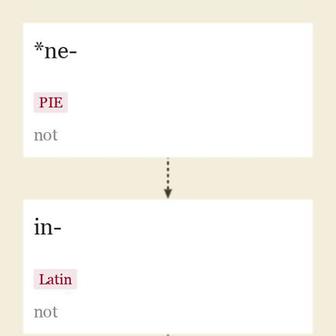innocuous (adj.)
"harmless, producing no ill effect, incapable of harm or mischief,"
1590s, from Latin innocuus "harmless; innocent; inoffensive," from in- "not" (see in- (1)) + nocuus "hurtful," from root of nocere "to injure, harm," from *nok-s-, suffixed form of PIE root *nek- (1) "death." Related: Innocuously; innocuousness.
Entries linking to innocuous
word-forming element meaning "not, opposite of, without" (also im-, il-, ir- by assimilation of -n- with following consonant, a tendency which began in later Latin), from Latin in- "not," cognate with Greek an-, Old English un-, all from PIE root *ne- "not."
In Old French and Middle English often en-, but most of these forms have not survived in Modern English, and the few that do (enemy, for instance) no longer are felt as negative. The rule of thumb in English has been to use in- with obviously Latin elements, un- with native or nativized ones.
Proto-Indo-European root meaning "death." It forms all or part of: innocent; innocuous; internecine; necro-; necropolis; necrosis; necromancy; nectar; nectarine; nociceptive; nocuous; noxious; nuisance; obnoxious; pernicious.
It is the hypothetical source of/evidence for its existence is provided by: Sanskrit nasyati "disappears, perishes," Avestan nasyeiti "disappears," nasu- "corpse," Old Persian vi-nathayatiy "he injures;" Greek nekros "corpse;" Latin nex, genitive necis "violent death, murder" (as opposed to mors), nocere "to harm, hurt," noxius "harmful;" Greek nekus "dead" (adj.), nekros "dead body, corpse;" Old Irish ec, Breton ankou, Welsh angeu "death."
Trends of innocuous
More to Explore
updated on June 06, 2019
Trending words
Dictionary entries near innocuous
innkeeper
innocence
innocense
innocent
innocently
innocuous
innominable
innovate
innovation
innovative
innovator

